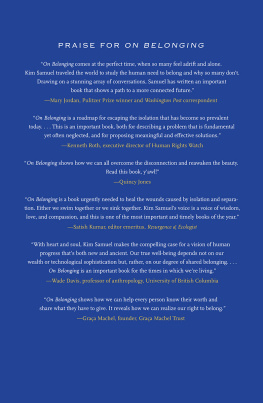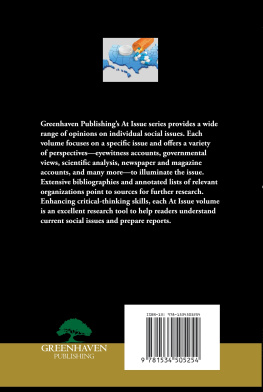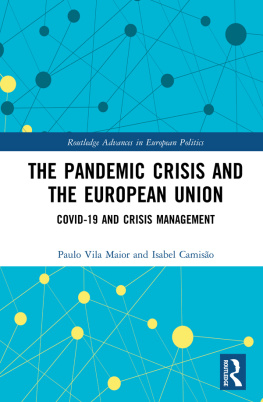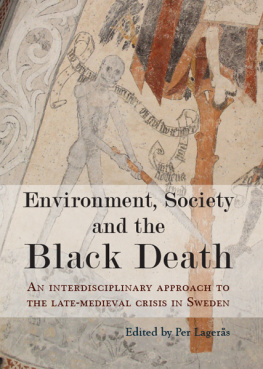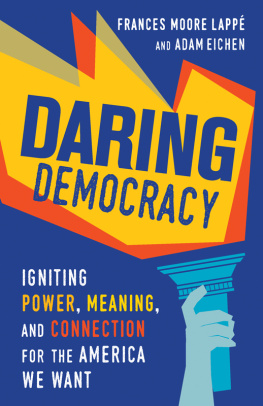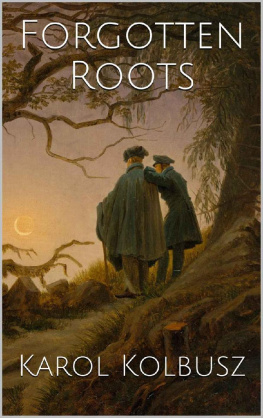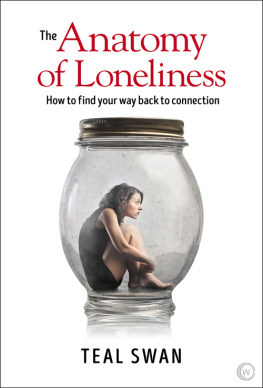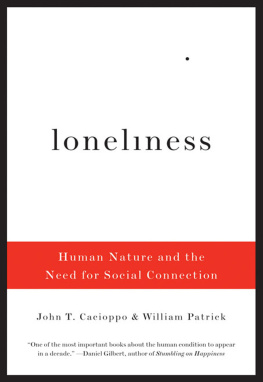Contents
Guide
Pagebreaks of the print version
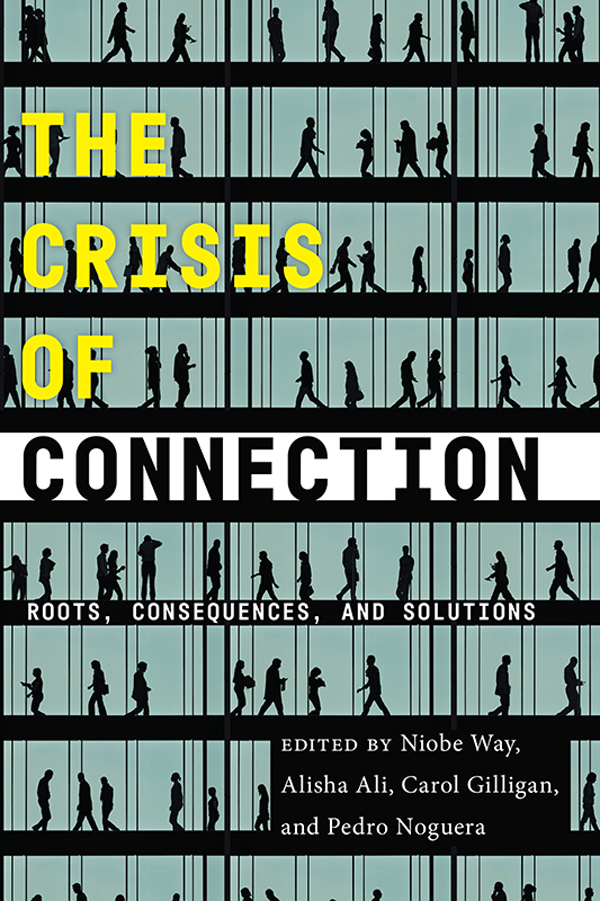
THE CRISIS OF CONNECTION
The Crisis of Connection
Roots, Consequences, and Solutions
Edited by
Niobe Way, Alisha Ali,
Carol Gilligan, and
Pedro Noguera

NEW YORK UNIVERSITY PRESS
New York
NEW YORK UNIVERSITY PRESS
New York
www.nyupress.org
2018 by New York University
All rights reserved
References to Internet websites (URLs) were accurate at the time of writing. Neither the author nor New York University Press is responsible for URLs that may have expired or changed since the manuscript was prepared.
Library of Congress Cataloging-in-Publication Data
Names: Way, Niobe, 1963 editor. | Ali, Alisha, 1970 editor. | Gilligan, Carol, 1936 editor. | Noguera, Pedro, editor. | Kirkland, David E., author of afterword.
Title: The crisis of connection : roots, consequences, and solutions / edited by Niobe Way, Alisha Ali, Carol Gilligan, and Pedro Noguera.
Description: New York : New York University, [2018] | Includes bibliographical references and index.
Identifiers: LCCN 2017044872 | ISBN 9781479802784 (cl : alk. paper) | ISBN 9781479819294 (pb : alk. paper)
Subjects: LCSH : Interpersonal relationsSociological aspects. | Interpersonal relationsPsychological aspects. | Interpersonal relationsMoral and ethical aspects.
Classification: LCC HM 1106 . C 75 2018 | DDC 302dc23
LC record available at https://lccn.loc.gov/2017044872
New York University Press books are printed on acid-free paper, and their binding materials are chosen for strength and durability. We strive to use environmentally responsible suppliers and materials to the greatest extent possible in publishing our books.
Manufactured in the United States of America
10 9 8 7 6 5 4 3 2 1
Also available as an ebook
To our children
TABLE OF CONTENTS
NIOBE WAY, CAROL GILLIGAN, PEDRO NOGUERA, AND ALISHA ALI
CAROL GILLIGAN, ANNIE G. ROGERS, AND NORMI NOEL
JUDY Y. CHU
JANIE VICTORIA WARD
LEOANDRA ONNIE ROGERS
PEDRO NOGUERA
MICHAEL KIMMEL
DEBORAH L. TOLMAN
ALISHA ALI AND CORIANNA E. SICHEL
LISA ARRASTIA
MARY GORDON
NIOBE WAY AND JOSEPH D. NELSON
VICTORIA RHOADES
JUDITH A. DORNEY
MICHAEL C. REICHERT AND JOSEPH D. NELSON
DANA EDELL
GARY BARKER
STEPHAN WOLFERT AND ALISHA ALI
KHARY LAZARRE-WHITE
HIROKAZU YOSHIKAWA
RABBI BURTON L. VISOTZKY, REVEREND CHLOE BREYER, AND DR. HUSSEIN RASHID
DAVID E. KIRKLAND
Introduction
The Crisis of Connection
NIOBE WAY, CAROL GILLIGAN, PEDRO NOGUERA, AND ALISHA ALI
At the beginning of the twenty-first century, we are beset by a crisis of connection. People are increasingly disconnected from themselves and each other, with a state of alienation, isolation, and fragmentation characterizing much of the modern world. The quintessential we, as in We the people or We hold these truths to be self-evident, which once served as a reference to a collective consciousness and state of communion, if not community, has lost all meaning. In the place of the we, we have been left with the me, the solitary individual, whose needs, wants, and desires take precedence over the collective. Human society has evolved to a stage where the rights of the individual, particularly those with wealth, power, and status, supersede all other rights and responsibilities.
Though the concept of a crisis of connection is not yet widely utilized, signs of its existence are everywhere. The decreasing levels of empathy and trust, and the rising indices of depression, anxiety, loneliness, and social isolation indicate a loss of connection at the individual and community levels. The impact of such a crisis is evident in the rising rates of suicide, drug addiction, and mass violence, and the high rates of incarceration, hate crimes, domestic violence, and sexual assault on college campuses, as well as astronomical inequality in income, education, health care, and housing. The crisis is, furthermore, reflected in our competition for basic human needssafety, good schools, housing, nutrition, clean water, and health careand in our tendency to treat social problems as individual or group-specific rather than collective concerns. We have conditioned ourselves to accept a variety of social maladies, such as the presence of homeless people living on the streets, as unfortunate but inevitable features of modern society and thus not a reflection of any type of crisis. In this book, we provide evidence that we are indeed in the midst of a crisis because as the bonds of solidarity and cohesion weaken, our ability to address our societal problems and pursue our common interests is severely damaged. Lamenting the current state of affairs, an opinion editorial in the New York Times recently concluded: When there is no we anymore then there is no legitimate authority and no unifying basis for our continued association.
While a failure to recognize an inclusive we or a common humanity has been evident throughout human history, it is the disconnection within, as well as across, communities that appears to have increased throughout the nineteenth and twentieth centuries and now accelerates as we push further into the twenty-first. Jane Jacobs, the activist, urban planner, and visionary author of The Death and Life of Great American Cities , Yet, despite widespread agreement about the fraying of human connection across and within communities, there is a lack of consensus as to the root of this crisis or what might be done about it.
Over the past four decades, however, the basis for such a consensus has emerged from discoveries within a wide range of disciplines, from neuroscience, developmental psychology, and sociology to evolutionary anthropology, health sciences, and primatology. The collective insights from these fields, coalescing in the newly emerging field of the science of human connection, each scientific discipline has remained largely isolated, focused on one component of the human experience and using one type of method, and rarely, if ever, communicating with other disciplines or methods. This blind men approach to science has resulted in an inability to hear or see the full story of human experience in culture and context or what lies at the root of our crisis of connection and how we can effectively address it.
The aim of this edited book is to tell the five-part story evident in the science of human connection that explains: (1) who we are as humans, with a focus on our capacity and need for connection; (2) what has led to our crisis of connection; (3) the evidence of the crisis; (4) the consequences of the crisis; and (5) the potential solutions.
The five-part story from the natural and social sciences begins with studies from developmental psychology, evolutionary anthropology, primatology, and neuroscience. We learn from the research, including the narrative based research with girls and boys, that humans are inherently responsive and relational beings, born with a voice, with the ability to communicate and engage with others, and with the desire to live in relationships.
However, according to the second part of the story evident in the sciences, there is a conflict between human nature and the modern culture we have constructed. We want to connect within and across communities, but we live in a society that is rooted in ideologies, beliefs, and values that prevent us from finding what we want and need most to thrive. Patriarchal ideologies, for example, lead us to privilege stereotypically masculine qualities and characteristics over those deemed feminine. Thus, we value self over relationships, individual success over the common good, the mind over the body, and thinking over feeling. Such priorities and preferences explicitly devalue core elements of our humanity and contribute to a decline in familial and communal bonds and a disconnection from oneself and others. Such stereotypes circulate in homes, schools, neighborhoods, workplaces, and the media, and compromise our ability to listen to ourselves and each other, create inclusive communities, or recognize our common humanity. Our ideologies and their corresponding stereotypes and values, in other words, lead to a crisis of connection.



